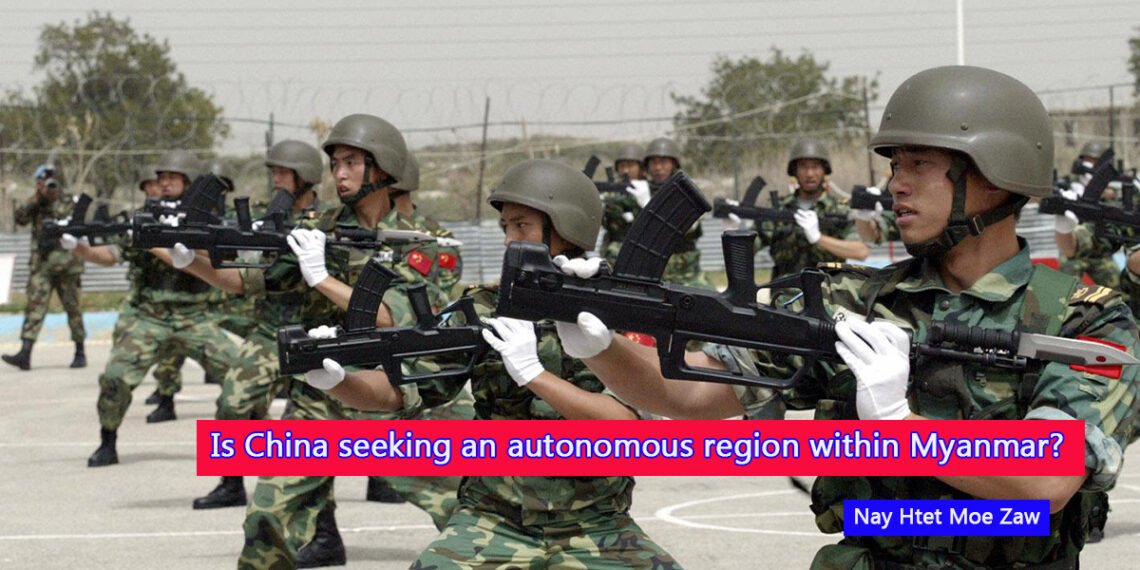Nay Htet Moe Zaw
Recently, there have been rumors circulating about China apprehending Kokang leader Peng Daxun. Let’s analyze the differing perspectives on this issue and consider what the potential future will be going on.
One group suggests that China has indeed detained Peng Daxun because the Kokang disobeyed China by seizing Lashio, refusing to withdraw, and allying with the PDF (People’s Defense Force).
Following the meeting between Chinese Foreign Minister Wang Yi and Min Aung Hlaing on August 14th, China has reportedly been pressuring the TNLA (Ta’ang National Liberation Army), while the Kokang have been issuing statements denying any alliance with the NUG (National Unity Government). China has also been exerting pressure on the KIA (Kachin Independence Army) and the Wa, while inviting Min Aung Hlaing to the Mekong meeting and meeting with the Chinese Prime Minister. These actions suggest that China is actively involved in Myanmar’s affairs.
Min Aung Hlaing has also publicly stated that China fully supports the five-point roadmap of the military council. The continuous bombing of towns held by northern ethnic armed groups has led to the perception that China is backing the military council and putting pressure on the northern ethnic armed groups.
It is also argued that the MNDAA (Myanmar National Democratic Alliance Army) and TNLA, despite their desire to continue the Spring Revolution alongside the NUG and PDF, are facing difficulties due to China.
However, on October 21st, China invited Peng Daxun for a meeting, and on the 23rd, Peng Daxun met with Wa leaders. Considering that both the Kokang and Wa have close ties with China, wouldn’t China have more influence over the Kokang’s capture of Lashio (whether related to the BRI or not)? Is it possible that the capture of Lashio was carried out with Chinese assistance or coordination?
So, why are there rumors of China pressuring the Kokang to return Lashio to the military council? One possibility is that these rumors are a smokescreen, with Peng Daxun’s supposed arrest being staged while Lashio remains under Kokang control (which can also be interpreted as being under Chinese control). Another possibility is that China facilitated the Kokang’s capture of Lashio, and then, under the guise of pressure, orchestrated their withdrawal, potentially gaining significant benefits from Min Aung Hlaing in exchange.
What is certain is that China is playing both the military council and the northern ethnic armed groups for its own interests. Furthermore, China is taking a new step by planning to send Chinese security companies to protect Chinese economic projects in Myanmar. The Myanmar military’s repeated defeats along the China-Myanmar Economic Corridor provide a convenient justification for this move. This raises the question of whether China deliberately orchestrated the Myanmar military’s decline to create an opportunity to send Chinese security companies (composed of former Chinese soldiers) into Myanmar under the pretext of protecting its interests.
On the other hand, it is important to consider the past attitudes of Bamar political organizations like the NLD towards the Kokang, Ta’ang, Wa, and Rakhine. How did they view these ethnic groups, their identities, and their right to self-determination? How much closeness, understanding, and cooperation existed between them? If the military had not staged the coup and the Spring Revolution had not occurred, how would they have viewed the Kokang, Ta’ang, Rakhine, and Kachin’s territorial gains?
Looking at China’s perspective, if the military council were to regain control of all the territories currently held by ethnic armed groups in northern Shan State, how would Min Aung Hlaing’s attitude change? How would China’s relationship with the military council evolve? It is unlikely that China would completely abandon the ethnic armed groups in northern Shan State and solely rely on the military council to maintain its influence.
For the ethnic armed groups in northern Shan State, China is a closer and more familiar partner than the NUG. They have a history of engagement and cooperation with China. They are aware that even if the NUG regains power, their attitudes towards them might change. Therefore, from a political standpoint, it is more plausible that they seized Lashio not for the NUG or PDF, but as part of a strategic maneuver in their dealings with China.
However, if China truly tightens its grip on the northern ethnic armed groups, the Kokang, Ta’ang, and Kachin, considering their population and military strength, will have to carefully consider whether they can maintain control over the territories they currently hold. They will also need to re-evaluate whether their territorial gains were achieved solely through their own efforts. The emergence of cracks among the revolutionary forces would benefit China and the military council, while rendering the sacrifices of the young revolutionaries in vain.
Therefore, it is also a matter of consideration for ethnic revolutionary forces to completely separate themselves from the NUG and PDF and place their full trust in China.
Ethnic groups faced a similar crossroads during the lead-up to independence from British rule. The shortcomings in their decisions at that time have led to the ongoing, seemingly endless civil war. It is crucial that they avoid making the same mistakes again.
A separate issue, though related to the situation in the north, is the matter of the Arakan Army (ULA/AA). Rakhine State, particularly Kyaukphyu, holds a strategically important position in the Myanmar section of the BRI project. Heavy fighting is currently taking place in four of the remaining towns in Rakhine that the Arakan Army aims to capture, and the military council is reportedly struggling to maintain control. The Arakan Army has also encircled the remaining three towns, including Sittwe and Kyaukphyu.
The fact that the Arakan Army has surrounded Kyaukphyu and already controls most of the surrounding areas, yet has not launched an attack and appears to be holding back, suggests that an assault on Kyaukphyu would inevitably involve some level of engagement with China. Therefore, it can be inferred that this delay is either a strategic move to seize all the remaining towns in Rakhine before targeting Kyaukphyu, or that some form of prior negotiation with China may have taken place. It is also possible that the military council has already accepted the eventual loss of Rakhine State and is making contingency plans.
On the other hand, even if the military council loses control of almost all of Rakhine State, it may still be trying to maintain its grip on the Chinese projects and the Shwe natural gas project in Kyaukphyu. China, for its part, would likely prefer to continue working with the military council, which it perceives as easier to control, rather than the Arakan Army. Therefore, China’s recent move to send armed security companies into Myanmar to protect its economic interests could also be seen as a step towards securing Kyaukphyu.
However, the 2008 Constitution, in Article 29, states that “No foreign troops shall be allowed to be stationed within the territory of the Union.” It remains to be seen how the military council will circumvent this provision. Similarly, the Arakan Army has repeatedly declared that no armed forces other than the Arakan Army should be present in Rakhine State.
Furthermore, the Arakan Army has firmly stated its intention to completely eliminate the military council’s presence in Rakhine State, making it unlikely that they would leave Kyaukphyu untouched. Therefore, the question arises: Will the Arakan Army allow the security forces that the military council and China plan to deploy in Kyaukphyu? If the Arakan Army attacks Kyaukphyu, to what extent will these forces be involved? And if the security companies are indeed stationed there, will the Arakan Army refrain from attacking the Chinese projects?
In fact, according to the Arakan Army’s frequently stated policies, they will protect foreign investments in Rakhine State, and no other armed groups should be present in the state. Therefore, China’s intention to directly protect its businesses with armed security forces directly contradicts the Arakan Army’s policies. Moreover, since the security companies will be operating in conjunction with the military council, the Arakan Army is unlikely to accept their presence.
Worst of all, if China demands the right to independently protect the entire China-Myanmar Economic Corridor and all Chinese economic projects in Myanmar with its own armed security companies, it could be seen as China claiming a special autonomous region within Myanmar. This would prolong the military council’s rule and allow Chinese armed security companies, operating under the guise of private firms, to become entrenched in Myanmar. This would hinder the aspirations of the Myanmar people who desire democracy and a federal union, and delay the goal of overthrowing the military dictatorship.
Nov 24 , 2024


